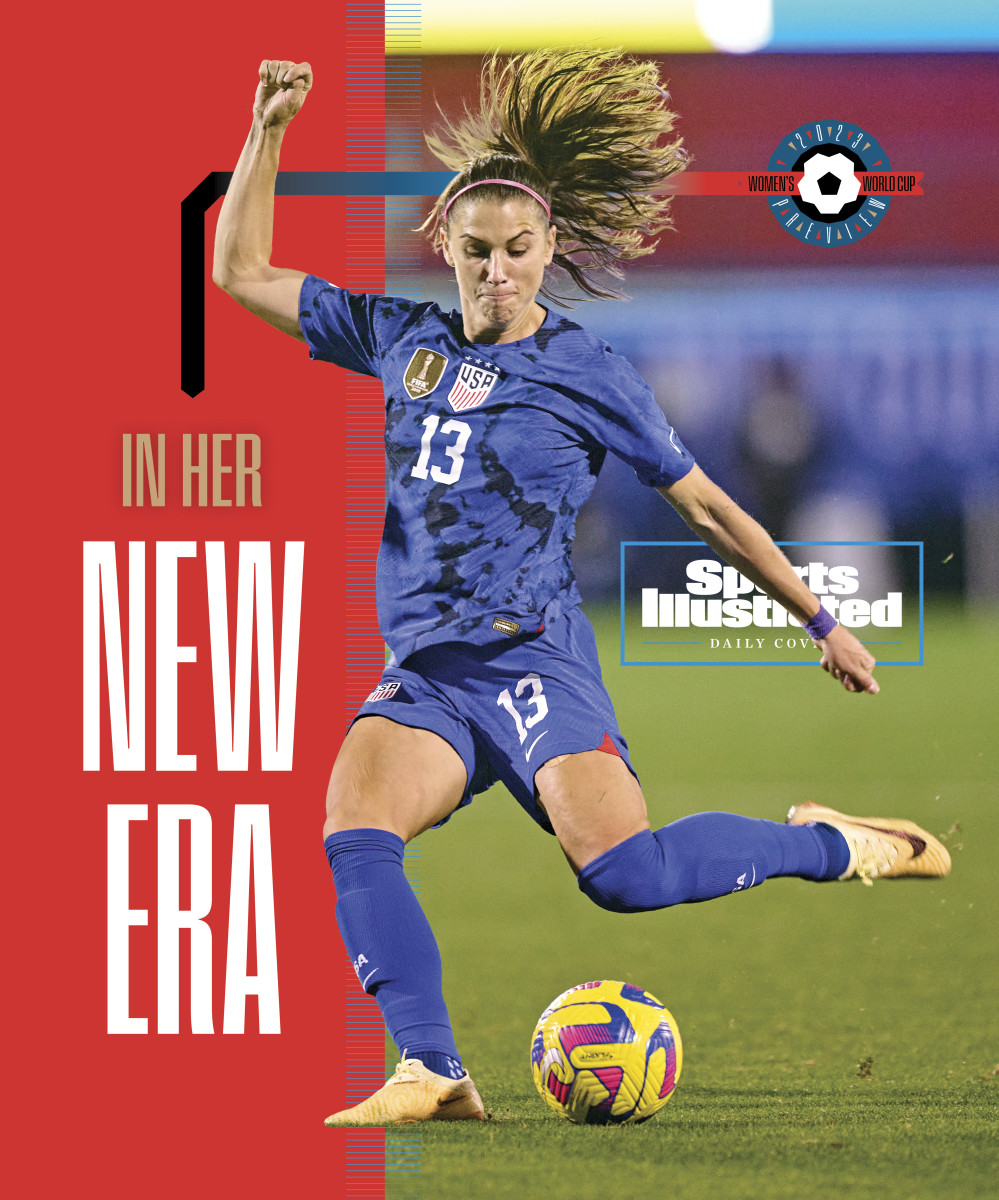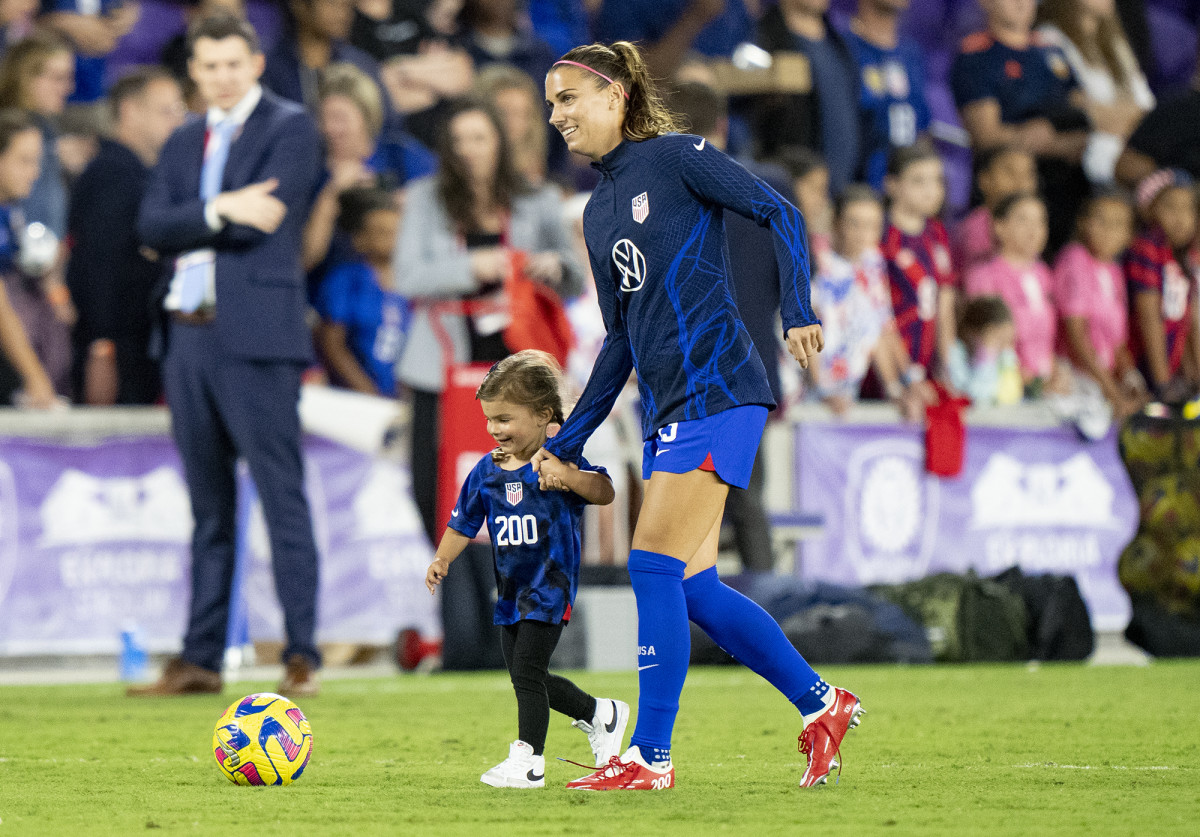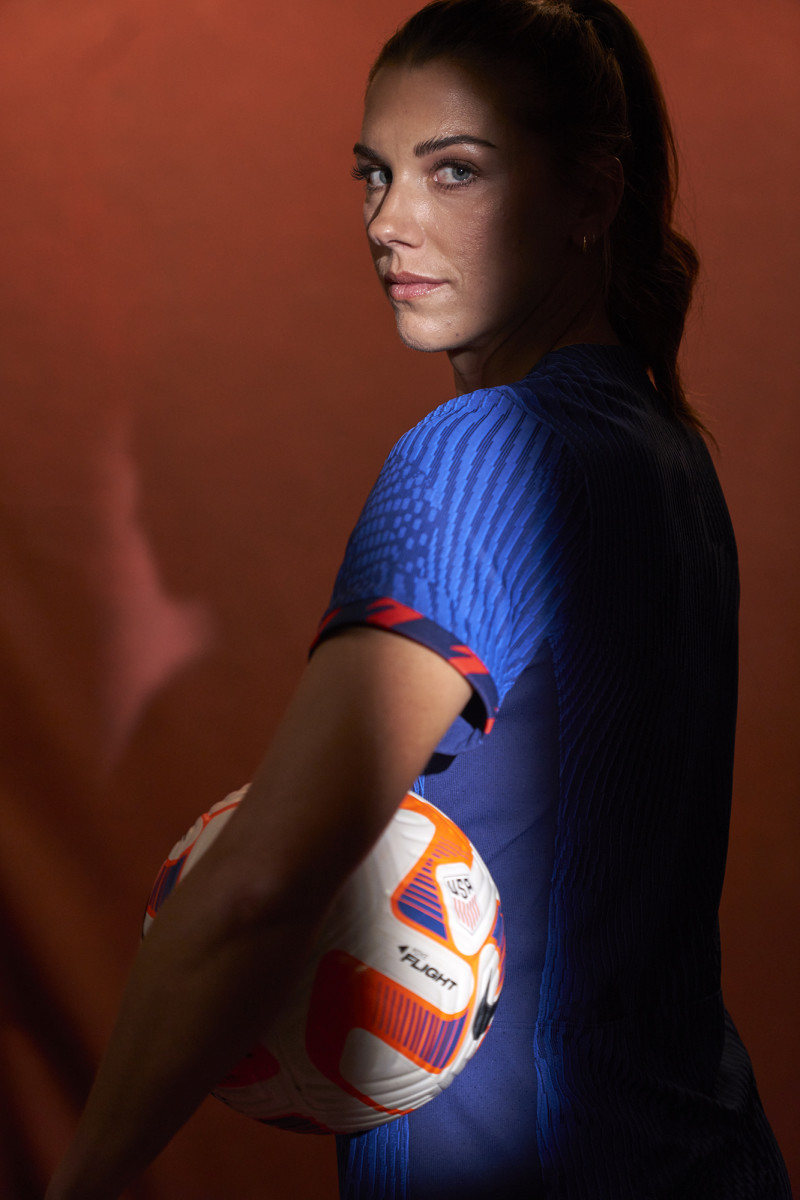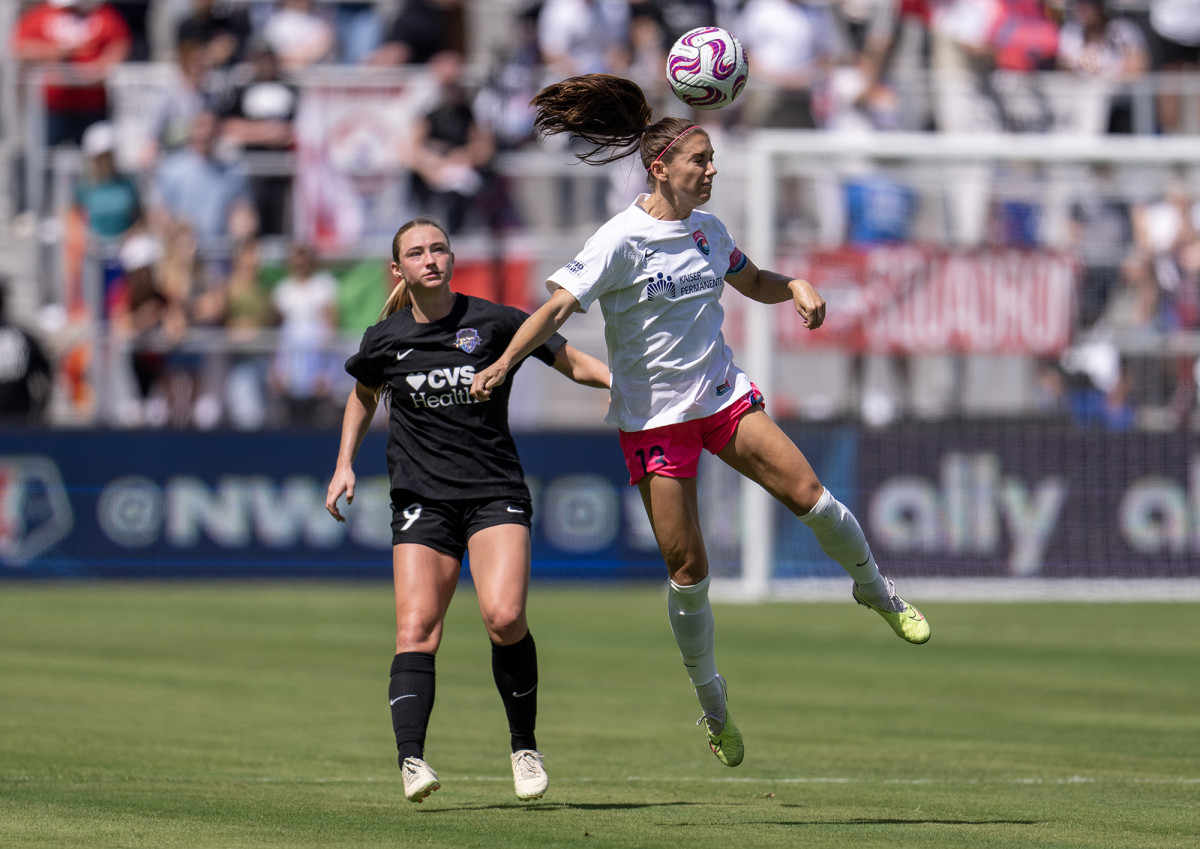Alex Morgan Is at Peace and Better Than Ever
The future is home in her soccer pajamas, eating a waffle and drinking a smoothie. Charlie Elena Carrasco says she is “2 and a half,” but she is actually a few days from turning 3. Someday, she will want to excel at math or science, or be a sports star, or start a company or run for president, and somebody will either tell her outright that she can’t because she is female, or she can’t (because she is female)—the sexism implied but not spoken, making it harder to call out. Right now, Charlie wants yogurt. Her mother gets up and walks to the fridge.
When Charlie was 1, the National Women’s Soccer League awarded an expansion team to San Diego, and Charlie’s mom, who grew up near Los Angeles, asked to be relocated to be closer to family. The official December 2021 transaction says the San Diego Wave acquired Alex Morgan from the Orlando Pride for Angharad James and a record $275,000 in allocation money, but as Charlie tells her mom: “Your name is Alex, but your real name is Mommy.”

Now Morgan and her husband, former MLS midfielder Servando Carrasco, live in Encinitas, and their extended family covers the area like sunshine. Morgan’s mom is in Newport Beach, her sister is in Mission Viejo and Carrasco’s family is in Tijuana. Morgan’s father lives a few minutes away, in Cardiff; sometimes he picks up Charlie from school in his golf cart.
Charlie picks up a toy that one of her cousins left here. She plays “Under the Sea” from The Little Mermaid on her Ariel doll and dances the dance of a child who has not yet been conditioned to be self-conscious. She knows what her parents are planning for her in the short term (preschool, a birthday party) but not in the long term (sibling[s], a more equitable society).
Even before she was conceived, Charlie was another in the endless series of false choices that society gives women. Pursue a career or focus on family. Speak up or be liked. Be charming or feisty. Fight for more or be grateful for what you have.
Have a child—or excel at the highest level of her sport? Morgan and Carrasco knew they wanted to be parents, but as the possibility grew more real, she wondered: “Will I be the same player I was before?” Then she got pregnant in the fall of 2019 and “felt like that all kind of went away.”
Since then Morgan has reconfigured her life around Charlie and her career around the next generation: off the field, where she led the fight for pay equity, and on it, where she will help guide young teammates in their first World Cup. Carrasco says, “She’s always had that moral compass pointing in the right direction. But now you have something tangible that’s running around. Just imagine how empowering that is for you as a mother. You’ve been doing this already. Now you have a little mini version of you.”
Morgan’s newfound purity of purpose settled her head. By the time Charlie jumped in a bounce house for her third birthday party, everybody around Morgan could see that her daughter was not a hindrance to her soccer career. She was a catalyst. Charlie’s mom will be 34 when the World Cup starts, and she is playing the best soccer of her life.

The 2019 World Cup was the kind of riveting sports entertainment that no one could have planned: Megan Rapinoe getting into a Twitter war with the then president of the United States and striking her now iconic are-you-not-entertained? pose with outstretched arms; Morgan toasting a goal against England by pretending to sip tea, then responding to criticism by slamming a “double standard for females in sports”; Carli Lloyd and Lindsey Horan mocking those critics by celebrating with a golf clap. They managed pressure with extraordinary grace and they did it by tricking themselves into thinking it wasn’t there.
“You don’t really notice it when you’re in the thick of it,” Morgan says. “You’re just operating as normal because you have to. Then afterwards, you just need a week to, like, sleep in a dark room. And I feel like there are some similarities to the lifestyle that I lived for seven or eight years.”
Indeed, as Morgan racked up endorsement deals and millions of social media followers, and solidified a firm place in the sport’s history, she often felt like she was living in a haze. She was unsettled; she did not have a home.
“The home that we really built—home as a metaphor—was in college,” Carrasco says.
They met as freshmen soccer players at Cal in 2007 and started dating soon afterward. They spent four nights a week together, ate Top Ramen for date night and had no way of knowing Morgan would become an international superstar. At that time, there was no established women’s pro soccer league in the U.S.; Women’s Professional Soccer, one of the forerunners of today’s NWSL, had yet to begin play.
They fell in love and eventually turned pro. Their careers are impressive if you view them as achievements but exhausting if you read them like itineraries. From 2011 to ’20, Morgan went from Buffalo to Seattle to Portland to Orlando to Lyon, France, and back to Orlando. Carrasco went from Seattle to Houston to Kansas City to Orlando to L.A. to Fort Lauderdale. Carrasco says, “We’ve had to be kind of [nomads] for the last 11 to 12 years, mainly because of me, because I was getting traded all over the place.”
They were good at being nomads. They were living in Hermosa Beach, Calif., when she became pregnant, moved to Miami two months before she was due and then, in the summer of 2020—with COVID-19 raging, many sports still on hiatus and Charlie less than 4 months old—Carrasco had an idea: You should go to Europe. The Tokyo Games were 10 months away, and Morgan needed competition. She joined Tottenham for two months—moving to London with Charlie and Carrasco’s mother—then returned to the NWSL ahead of the Olympics.
One reason Morgan has handled fame and pressure so well is that she naturally attacks what is in front of her, not what might come after. Wave general manager Molly Downtain, who served as the USWNT team administrator for six years, says “she’s probably the most straightforward player I’ve worked with.” But perpetually uprooting and rerooting instilled a baseline level of anxiety that was so ingrained in her life, Morgan didn’t even realize it was there.
The Tokyo Olympics felt more like a science lab than a sporting event: no fans, no family, no fun. Morgan says she spent 35 days away from 1-year-old Charlie, and all she could do for most of that time was think about the distance. COVID-19 restrictions meant players spent most of their days in hotel rooms. Morgan, who usually has 20 to 50 family members at major events, says, “It was really difficult to feel so isolated. I took that harder than maybe some other players.”
She scored one goal in six games as her team earned a bronze medal. Then Morgan—who says, “I would never even pull myself out of a training session if I had a pulled quad, you just push through”—did what she never imagined doing: She admitted she was spent.
“I vocalized to coach Vlatko [Andonovski] that I was not mentally 100% in it at the moment, because of the year that I had, and I could benefit from some extra time off,” says Morgan. She had planned to join USWNT in Australia in the fall of 2021, but now she didn’t want to go. “That just didn’t sit well with him. And given the Olympics and how we did, he wanted to turn the page and get started on preparing for the World Cup.”
She says Andonovski told her there was no guarantee she would get her spot back. This is how the national team works, but Morgan was not ready to hear it. “It was honest and it was direct,” she says. “And I think that I appreciated it. But it was difficult.” When the call ended, she turned to Carrasco with tears in her eyes. She had gotten what she wanted, but at the same time: “I [didn’t] know my future with the national team.”
Andonovski, who declined comment through U.S. Soccer for this story, has said he wanted to give young players international experience, but also that veterans needed to “show that they can still contribute and be valuable.”
Morgan had tears but no regrets: She was, somehow, simultaneously at peace with her USWNT career possibly being over and also determined not to let it end. After a lifetime of pouring everything into her sport, she realized she could keep the fire and lose the angst. She refers to her next few months as “working my way back from the outside of the national team.” If she had to swallow any hard feelings toward U.S. Soccer . . . well, she was used to that.

Alex Morgan et al. v. United States Soccer Federation, Inc. began with an Equal Employment Opportunity Commission charge of discrimination March 30, 2016, became official March 8, 2019, and ended with a settlement Feb. 22, 2022, which was largely considered a victory for the players, and what most people will not notice in this sentence is the dates.
For six years Morgan fought with her employer. She was the lead plaintiff and was in the room during bargaining sessions. As part of the team’s “legal committee,” along with Becky Sauerbrunn, Kelley O’Hara, Christen Press, Rapinoe and Lloyd, she regularly discussed strategy with lawyers and players. Morgan felt U.S. Soccer was “trying to just smear the work that we’ve done and plead their case in a way that is not wholly truthful.” Yet the players tried to bring glory to those who diminished them.
“That was really hard, to see the things that were said about us, but then go play games and train and do interviews on their behalf,” says Morgan. “It was a very long and painful fight with U.S. Soccer that was extremely uncomfortable at times.”
Carrasco says, “There’s times where it’s a lot. She knows it’s a lot. She continues to do it: ‘This is the goal. I will be stubborn as f--- to get there.’ ”
The fight was filled with more false choices: Were they playing for money or for their country? If the players wanted higher pay per game, did they want to play fewer games? Later, it also prompted other national teams to protest inequitable and unfair treatment by their governing bodies. Three years after the U.S. took a stand at the SheBelieves Cup in 2020, Canada—the Tokyo gold medalists—vocalized its own fight at the same tournament in February, wearing purple warmups as a “symbol of protest” after demanding “immediate change” from its federation.
Morgan describes the victory this way: “Trinity Rodman has never been on the U.S. women’s national team when it has not been equal—when we have not had the same amount of coaches, the same amount of athletic trainers, the same amount of pay, the same charter flights, the same resources. That’s amazing. That’s what we fought for.”
Carrasco is more succinct: “That’s for Charlie.” He doesn’t mean they expect her to play on the national team someday. He means that Morgan wants Charlie to grow up in a world of gender equality.
It was part of a larger shift for Morgan. She had shown empathy before, most notably in 2020, when her Portland Thorns teammate Mana Shim confided that she and fellow player Sinead Farrelly had been coerced into sex with their coach, and then they spoke about it openly, on the record, when The Athletic reported the story. But after the ’19 World Cup, Morgan decided “nobody can take away” what she had accomplished, and it was time to focus on something more universal. Now she views her career more for what it can do for others, shunning another false choice: the implication that women who help one another in the workplace are hurting themselves.
Former USWNT coach Jill Ellis, who is now the Wave’s president, says: “This is the thing about Alex: She is someone who wants to constantly evolve. I never saw her cut a corner in my life.” Ellis says when the team holds meetings in classrooms, Morgan sits in the front row and asks questions. After practice, she takes a ball and tries to add skills to her repertoire.
Motherhood has brought a perspective that she carries to the pitch. Morgan says: “I am just as hungry for more [as] I was five or 10 years ago, but I don’t necessarily feel the pressures that I felt then.”
Ellis says: “There is always pressure: to make a roster, to perform, from sponsors, from teammates and coaches. I do see a sense of calm.”
The calm permeates everything. Carrasco says, “She just thinks so much faster on the field.” Ellis says Morgan “would take minimal touches on a ball,” but now she is more patient. Speed has always been Morgan’s defining physical trait, but in recent years she improved her tactical awareness, which helped her create more scoring opportunities for herself. Then she improved her ability to create for others, too. Morgan’s play, like Morgan’s life, is now about getting more women involved so everybody can benefit.

Morgan has won two World Cups, an Olympic gold medal and an NWSL championship. Her career has been a wild success—and also a reminder that even the rich and famous cannot opt out of the patriarchy.
Her performance at the 2012 Olympics was fairy dust for her marketability; in less than three weeks, Carrasco says now, “You basically go from a promising talent to a global star.” She has been one ever since. But while millions of sports fans knew who she was, very few of them watched her play. High-stakes World Cup and Olympic matches drew strong TV ratings, but three iterations of pro leagues had not attracted a mass audience.
It raised questions that most male athletes don’t have to ask. Why were people eager to watch her play for their country, but not for her team? If she was one of the best players in the world, why did she make roughly the same salary from her professional franchise as Carrasco, who was not nearly as accomplished? Did the public see her as a superstar athlete or as a spokesperson, Instagram influencer and model who played soccer sometimes?
Society tells you who you are until you say otherwise. While others said there was no market for women’s pro soccer, all Morgan heard was an excuse. She grew frustrated with the lack of promotion in the NWSL: “People never knew that we even existed when we went back to our club market,” she says. Customers can buy only what people try to sell.
In just the past two years, NWSL expansion fees have grown more than tenfold, to north of $50 million. If the underlying economics don’t yet support the price increase, that’s the point. Wealthy people are not buying NWSL teams for an easy buck; they are doing it because they see the future and they want in, for the long term.
“In men’s sports, you didn’t have to have a proof of concept,” Morgan says. “There was investment before any return. And it [took] 10, 20, 30 years. In women’s sports? Oh, no, no, no. ‘You have to show us that it’s worth it to invest.’”
After 10 years of “proof of concept” with the NWSL and the national team, Morgan says, people are finally viewing women’s soccer as a good business decision. “We’re over here saying, ‘We f---ing told you!’” she says.
As recently as five years ago, Morgan would look in the stands and “it was girls soccer teams. That’s all we saw at our games.” Now, though, she sees more boys and men, and they’re all there for the game, not the autograph.
Morgan’s life now is such a smooth blending of fame and family that only Charlie seems to differentiate between Alex Morgan and Mommy. As she got ready for a commercial shoot, she chatted about FIFA’s attempts to sell Women’s World Cup broadcast rights in Europe and when she might have more children. One day, as she drove Charlie to school, Morgan realized she had forgotten water; she took a bottle of BodyArmor, a drink she endorses, and wrote Charlie’s name on it.
She launched the Alex Morgan Foundation, with a focus on giving girls opportunities and support to mothers. She cofounded a media and commerce company, Togethxr, with fellow sports stars Chloe Kim, Simone Manuel and Sue Bird.
Ellis calls Morgan “one of the most f---ing competitive people I’ve ever seen.” Athletes with that wiring tend to thrive, then suffer: They live to play games, but they can’t play forever. Morgan says, “I definitely don’t feel like I’m one of those athletes that will walk away and feel lost.”
She says she is less nervous about this World Cup than previous ones. Maybe that is because she is less nervous, period. “I just feel more at peace when I go to training, or when I show up to Zoom meetings or interviews,” says Morgan. “I just feel more comfortable with what I bring to the table.”
Whatever happens in Oceania, Morgan has a solid place in soccer history, the life of her choosing in San Diego, a plan for when she stops playing soccer and the comfort of knowing that if she gets knocked backward, that’s O.K.: She has her little girl and thousands of others behind her. New Zealand, Australia and the rest of the 21st century are on notice. Alex Morgan et al. are coming.
